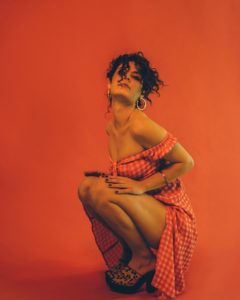The sound of Gabrielle Cavassa’s voice has broken through the jazz scene of New Orleans. Four years after her arrival in the city, she has formed a following of fans who eagerly anticipate her performances.
She tried her best to grow up on jazz, but claims she didn’t know what the word meant at all while growing up in Southern California. “San Diego is certainly not a jazz capital—I didn’t know what it was, no one knew what it was,” she said.
On a trip to New York City at age thirteen, Cavassa’s grandfather brought her to the iconic Blue Note nightclub. He declared to the employees, much to Cavassa’s embarrassment, that his granddaughter would play there one day.
“My parents are not super musical, so music was like this gift to me,” she said of a Christmas song compilation her parents owned, featuring singers such as Nancy Wilson, Ella Fitzgerald and Nat King Cole. “It was like a privilege whenever I could hear it, and I got obsessed with lots of records early on.”
Cavassa begged her parents to allow her to join the school choir and participate in plays and talent shows. Her pursuit of a musical career led her to the University of San Francisco where she earned a degree in jazz history.
At age 21, her voice became her craft and a means of earning a living.
She performs in a variety of repertoires, each demanding the ability to mold her voice into different characters according to song.
She recalled a gig she had on a cruise ship that circled San Francisco Bay at night, featuring a piano player. At the end of every ride, she was required her to sing “I Left My Heart in San Francisco’.
“I was like, I don’t wanna sing that song, it’s cheesy. Slowly, it became my favorite song,” she said.
Of her singing style, Cavassa says, “I think honesty has a way of moving beyond the lyrics. If I was singing a song that lyrically wasn’t true, it could still have something that was real to me.”
Cavassa decided she had to to move to New Orleans while listening to an Americana band at the Hi-Ho Lounge on St. Claude Avenue.
“I just thought it was so incredible how much music there was,” she said of New Orleans. “I heard so many styles played at such a high level and with such passion in such a short amount of time. I feel like I learned so much and that I needed to be here. I just couldn’t imagine knowing that that place exists and not being in it.”
The traditional jazz scene was initially intimidating, greeting her with different styles previously unknown. Her early attempts to fit in led to being fired with claims that her voice was “too soft or too ballady”.
She undertook an education in New Orleans music by visiting the clubs and listening to vocalist Germaine Bazzle, Cory Henry and his brass-band sets at Vaughan’s and jazz orchestras at Snug Harbor.
New Orleans taught Cavassa that music should be directed at an audience rather than being judged by fellow musicians.
“There are so many styles in New Orleans but they all have the same energy, which is all for the audience… good music is music that reaches people here in New Orleans. That seems like it’s the goal, no matter what style it is.”
The Starlight Lounge in the French Quarter is where Cavassa found her true voice and formed a band. She would record her first album, self-titled, with the same ensemble, released in August 2020 in the midst of pandemic isolation without a celebratory show.
Although the moment was lonely without friends and a band, the LP’s debut as an online release allowed for a wider audience reach.
“The jazz world is a convenient package sometimes, and I think what happened instead was me sort of not labeling it in this way,” she said.
The lockdown also led Cavassa to pick up the guitar, which led to a surprising opportunity. “As soon as people see me with a beautiful guitar, they’re like ‘we’ll hire you for this documentary!’” she said of her appearance in an episode of the Take Me to the River docuseries shot at Esplanade Studios by Martin Shore.
Cassava discovered there’s an economical advantage of being a one-woman show but there vulnerability in playing solo.
“Part of performing alone is so different, so singular because so much of what I do is reacting to the other musicians. So much inspiration is coming from what the bass player or drummer is playing we’re all reacting to each other. Which is one of the things I love about music,” she said.
As the pandemic wanes and live music returns to New Orleans, Cavassa can be heard at venues around the city, including a weekly gig at the Royal Frenchman Hotel.
She dreams of selling out One Eyed Jacks and desires a return to the Starlight Lounge. Her canceled tour for the record release awaits a possible revival at the end of the year.
“The way that I love has been so painful for me and I’m so glad that I have music as an outlet to talk about that and express that. That’s probably the me-est thing that there could be.”




